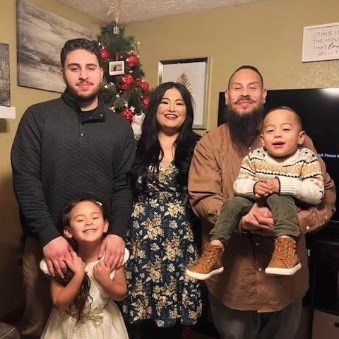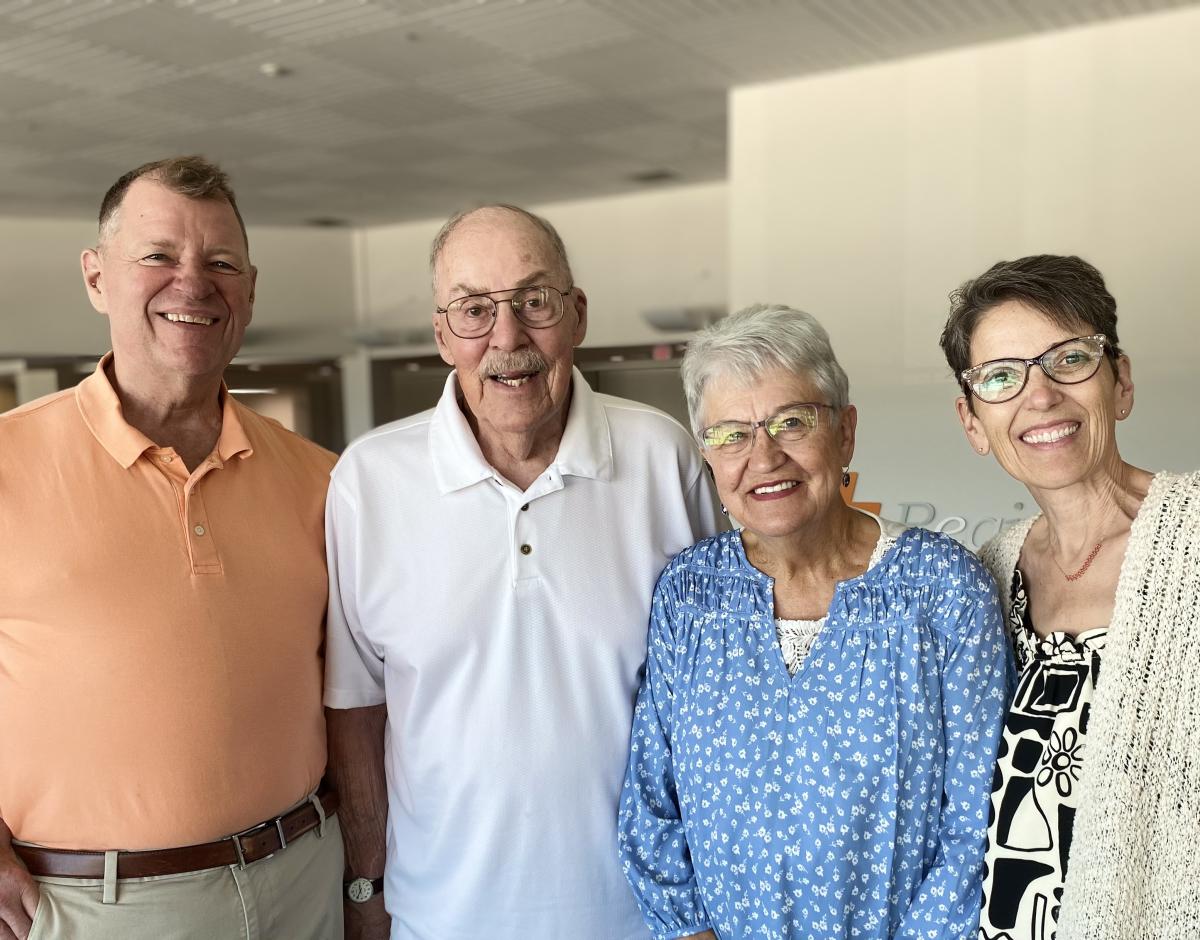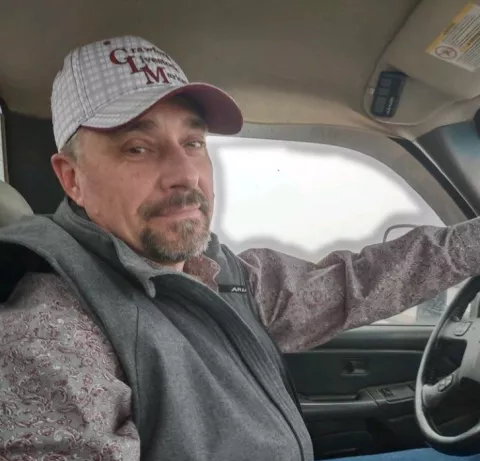Phenomenal Care
It was Time to Act Quickly
Watching a Spouse Experience Cancer Can be a Helpless Feeling
My Chest Felt On Fire
It was Business as Usual
All the Emotions Came Rushing Back
Phenomenal Care
 “My husband was admitted into the ICU from Aug. 26 through Sept. 18. The care we received was phenomenal. The situation was beyond scary, a literal life or death situation, and having genuine care was paramount. There were several standout nurses, specifically Kayla, Gem, Kaitlyn, Cassidy, Bekki, and Alvin. They took such great care of my husband, as if they were caring for their own family – it meant everything to us. Furthermore, they were extremely accommodating to our family. Always checking in and making sure we were okay and understanding everything that was going on. There were a lot of hugs on his last day there. We appreciate you all so much.
“My husband was admitted into the ICU from Aug. 26 through Sept. 18. The care we received was phenomenal. The situation was beyond scary, a literal life or death situation, and having genuine care was paramount. There were several standout nurses, specifically Kayla, Gem, Kaitlyn, Cassidy, Bekki, and Alvin. They took such great care of my husband, as if they were caring for their own family – it meant everything to us. Furthermore, they were extremely accommodating to our family. Always checking in and making sure we were okay and understanding everything that was going on. There were a lot of hugs on his last day there. We appreciate you all so much.
The Café food was great, and the staff was kind. They recognized we were there a lot and took time to check in and see how Sam was. The entire respiratory and physical therapy team were amazing, walking us through everything.
The neurosurgeon, Dr. Samuelson, was extremely patient with us, giving us time to ask questions and kept us "in the know" at all times. If he saw us in the hall, he took time to say hello and ask how we were. That was HUGE for us. I cannot thank him enough for his focus and attention. He went above and beyond and involved Dr. Jimenez to provide the best outcome for Sam, and it was! He progressed and progressed and continues to progress from what was an extremely dire state. Dr. Samuelson and Dr. Jimenez, we were truly blessed to be in your care. THANK YOU!”
~ Krista Orozco
It was Time to Act Quickly
 When Harry and Bonnie Meister went out for dinner on Feb. 25, 2023, they didn’t think they would end their night flying to Swedish Medical Center for emergency stroke care.
When Harry and Bonnie Meister went out for dinner on Feb. 25, 2023, they didn’t think they would end their night flying to Swedish Medical Center for emergency stroke care.
The couple was at a restaurant in Scottsbluff when, after going to place her husband’s Keno bet, Bonnie noticed Harry wasn’t responding to her. She tried to get him to speak, but he simply stared into the distance. That’s when she knew something was wrong, and it was time to act quickly.
“Right away I knew there was a bad problem, probably a stroke,” she said. “I called 911 right away and they came and got him.”
“I remember Bonnie saying to me, ‘Talk to me. What’s my name?’ I attempted to talk, but I couldn’t talk at all,” Harry recalled. “She did not ask for the management; she did not ask for anybody. She picked her phone up immediately and called 911.”
Thanks to Bonnie’s quick actions, Harry was at Regional West’s Emergency Department within minutes. Their son, Mike, and his wife, Michelle, arrived shortly after. A CT scan and a telemedicine consult with a neurologist from Swedish Medical Center in Denver, Colorado confirmed Harry’s stroke diagnosis, meaning it was time for him to receive Tenecteplase (TNK), a medicine used to dissolve blood clots.
“It was incredible how quickly everybody knew what to do,” Michelle said. “It was a well-planned program, and I was really impressed.”
Harry then flew on Air Link to Swedish Medical Center, Regional West’s partner in stroke care. At Swedish, he underwent an intra-arterial thrombectomy, a procedure to remove the blood clot in his brain. He also had a stent placed in an artery that had a blockage. After seven days of what Harry called ‘excellent, excellent care,’, the Meisters drove back to Scottsbluff so Harry could complete rehab in Regional West’s Acute Rehab Unit (ARU).
Over the next 10 days, Harry worked hard to regain his strength through physical and occupational therapy. Though the exercises were challenging, he was happy that the rehab team kept him informed of the ‘why’ behind his efforts.
“They really work you out, and they’re very serious about it, but they explain what they’re doing very well. They work with you to see where you’re at and what you can do to improve,” he said.
Mike said that Harry has always been active. In his younger years, Harry played baseball and basketball with legendary St. Louis Cardinals pitcher Bob Gibson, hitting the longest home run that Gibson ever pitched. It was important to Harry to get back in motion.
“The fact that Acute Rehab got him off his tail and back to being active is a huge applause for Regional West Medical Center,” he said.
When Harry first arrived at Regional West, his National Institutes of Health Stroke Score (NIHSS) was 21, meaning he had suffered a severe stroke. When he was discharged from the ARU, his score was 1 – a remarkable recovery.
Today, Harry is healthy and active at 89 years old. He and Bonnie eagerly anticipate future family events and the chance to create more cherished memories with their six children, many grandchildren, and great-grandchildren. The Meisters have high praise for both Regional West and Swedish Medical Center and look forward to new adventures together.
“Throughout this whole ordeal, I have had little to no pain,” Harry said. “I’ve been very fortunate, and I thank the good Lord for that.”
Watching a Spouse Experience Cancer Can be a Helpless Feeling
 Watching a beloved spouse experience cancer can be a helpless feeling, especially during the early months of the COVID-19 pandemic when people were unable to accompany their loved ones to doctors’ appointments and tests.
Watching a beloved spouse experience cancer can be a helpless feeling, especially during the early months of the COVID-19 pandemic when people were unable to accompany their loved ones to doctors’ appointments and tests.
Gering resident John Mulholland faced this challenge when his wife, Anne, began feeling unwell in August 2020. Over a period of several days, one breast became swollen and discolored. As a 12-year breast cancer survivor, she immediately went to Regional West’s Emergency Department where she had a mammogram and biopsy that day, both with inconclusive results. Antibiotics were prescribed for a breast infection and Anne returned two weeks later for further testing, as her physicians were convinced that a tumor was lurking.
“The physicians at Regional West were absolutely relentless as they searched for what they highly suspected was breast cancer,” said John. “They found the cancer, and Anne chose to have a double mastectomy and reconstructive surgery. We are so grateful for the incredibly high level of care that she received – from the surgeons and providers to radiology and the billing department, we had nothing but positive encounters. We felt the genuine care and concern with every interaction.”
John said that while it was difficult not being with Anne during some appointments and procedures due to COVID-19 restrictions, he trusted her care team to offer support when he physically couldn’t be in the room.
“Regional West is a part of our community. We know some of her caregivers outside of the hospital setting and we trust them; their care and concern are so real. We chose to stay at Regional West throughout Anne’s cancer journey because the people who work there are our friends and neighbors, and bottom line, she received great care.”
John concluded, “So many good things are happening at Regional West. As a community, I feel like we should celebrate that whenever possible.”
My Chest Felt On Fire
On the morning of February 10, Tyson felt great. He ran a few errands and headed home to do a little work. Once home, his chest felt like it was on fire. After a few unsuccessful attempts to sooth his symptoms, he headed to Regional West. Watch this video to hear the rest of Tyson's story.
It was Business as Usual


It was business as usual for Jayme Lefor on Feb. 28, 2022. Hauling 45 head of cattle to Crawford, Nebraska for a client, his semi truck and trailer was the last of four to cross the railroad tracks. A blind crossing with no lights or arms, Jayme said he never saw the train that smashed into him, ripping the truck’s cab from its frame and sending it flying 60 yards with Jayme inside.
He regained consciousness to hear cattle bellowing frantically. His first thought was getting the cows out of the now burning truck, but found that a.) he couldn’t move his leg, and b.) the truck had flipped upside down and he was sitting on the ceiling.
The Crawford ambulance and Regional West’s Air Link helicopter were dispatched immediately while drivers from the other trucks worked to free the cattle and comfort Jayme. Eight cattle perished in the accident. After crawling out of the now mangled cab’s broken window, ambulance and Air Link personnel carefully tended to him. Jayme was flown to Regional West, where a full trauma activation was initiated in anticipation of his arrival.
Jayme is grateful for how communicative the Air Link crew was with him during the flight to Regional West, and for the rapid care he received. To thank them, he had an appreciation plaque made and personally delivered it to Air Link early this year.
“The Air Link crew is an amazing, elite group of people,” he said. “Without them, I probably wouldn’t be here.”
With a small brain bleed, a partially collapsed lung, eight fractured ribs, a separated shoulder, torn clavicle, a head wound, and a compound fracture of his right leg, Jayme was in bad shape.
Following surgery, he spent nine days in the hospital, seven of those in ICU. After being in a wheelchair for two months, he progressed to a walker, then crutches, and had an additional two surgeries on his leg.
Jayme said that, thanks to the excellent care he received, he was able to put up 1,000 acres of hay five months after his accident, while on crutches. Today, he walks unaided and says he feels “pretty good!”
According to Jayme, he took many things for granted prior to his accident, and now has an entirely different outlook on life. “I can’t say enough good things about everyone at Regional West who helped me,” he said. “From Air Link to the doctors and nurses and everyone in ICU – they were amazing. They saved my life.”
All the Emotions Came Rushing Back
 When Gering resident Nikki Danielzuk arrived at Regional West recently for a surgical procedure, all the emotions surrounding her birth experience three years prior came rushing back. She was outwardly calm this time but recalls that her husband Chase was anything but.
When Gering resident Nikki Danielzuk arrived at Regional West recently for a surgical procedure, all the emotions surrounding her birth experience three years prior came rushing back. She was outwardly calm this time but recalls that her husband Chase was anything but.
“After I went into surgery, Chase was a wreck,” Nikki said. “As he walked to the cafeteria for a snack, two separate Regional West employees approached him in the hallway to ask if he was okay.”
Appreciating the friendly faces, Chase shared his fears. Soon after getting word that Nikki was out of surgery and doing well, one of the employees tracked him down and asked how she was doing. It turns out it was Regional West’s interim CEO Mel McNea.
Nikki expressed appreciation for the exceptional care she received before, during, and after her surgery. She said that the level of customer service experienced by her, and her husband speaks to the excellence of the hospital staff.
“My Regional West experience was wonderful from start to finish,” said Nikki. “Chase and I are so appreciative that, as my support person, his experience was great as well.”
Nikki gave birth to their second son, Barrett, at Regional West’s Birth and Infant Care Center in 2020. She had a caesarian section delivery with her first child, but the plan was to have a vaginal birth after caesarean (VBAC) delivery with Barrett. However, a ruptured uterus during delivery changed plans quickly for the late Matthew Bruner, MD, FACOG; Nikki; and the delivery team.
“We were trying to do the delivery naturally, and it was great until it wasn't,” Nikki said. “Dr. Bruner, who was just a wonderful physician, saved both of us. The delivery team utilized therapeutic hypothermia (a treatment that lowers a newborn’s body temperature to prevent or minimize brain damage caused by lack of oxygen or another injury during birth). They knew not to warm Barrett and instead cooled him to prevent brain damage. Although it initially seemed like the worst-case scenario, it ended up being the best possible outcome.”
Barrett is now a healthy, rambunctious three-year old. Nikki said she and Chase reflect on his birth experience with every milestone he reaches, especially on birthdays, and she wants people to know about their family’s positive experiences at Regional West.
“We are so thankful for the outstanding care we have received at Regional West,” she said.